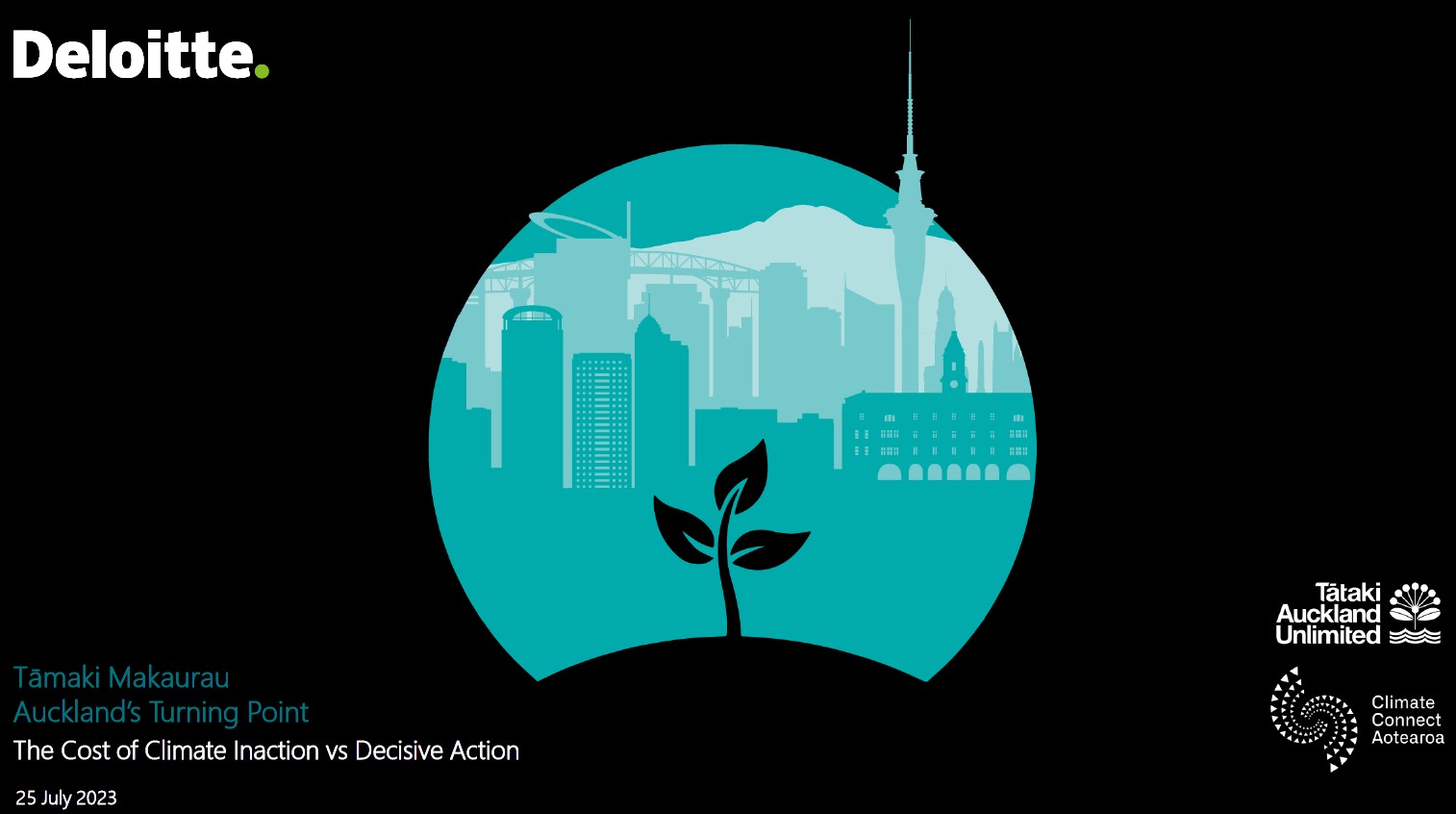Tāmaki Makaurau Auckland’s turning point. The cost of climate inaction vs decisive action
Author:
DeloitteSource:
Tātaki Auckland Unlimited | DeloittePublication date:
2023Topics:
EnvironmentTātaki Auckland Unlimited
Executive summary
Taking decisive action can pay off substantially. The Auckland region can reach its turning point in 2037 the time when the costs are outweighed by the benefits.
The Auckland region is New Zealand’s economic, cultural and population hub. It is the heart of New Zealand’s largest metropolitan area, both by population and landmass. It is home to a diverse population, and is the Polynesian capital of the world.
The Auckland region acts as an innovation hub and is the economic centre of New Zealand, generating 38% of the nation’s GDP. The economic makeup of the region differs from the rest of the country, with the services sector a key contributor to its economic activity, along with wholesale and retail trade.
The Auckland region has a unique emissions profile and has taken steps to accelerate emission reductions. Its metropolitan nature and differing economic makeup means the region’s emissions profile is distinct to the rest of New Zealand. The Auckland region has a more ‘city like’ emissions profile and accounts for 12.4% of all of New Zealand’s emissions, 3 with transportation and manufacturing significant contributors. This is in contrast to the rest of New Zealand, where the emissions from the primary
sector play a larger role.
As a region, Auckland has taken steps to accelerate emissions reductions, such as formulating and adopting Te Tāruke ā Tāwhiri: Auckland’s Climate Plan and the Transport Emissions Reduction Pathway.
The region is already experiencing the impact of climate change. Extreme rainfall is projected to increase, as is drought, due to changing rainfall patterns and temperature increases. As one of the top 10 cities in the world to live in, the Auckland region has a reputation to protect and enhance and ensure it is resilient to a changing climate.
Against this backdrop, Tātaki Auckland Unlimited (TAU) is interested in exploring the costs and benefits of inadequate and decisive action on climate change.
This report focuses on the GDP and workforce impacts of two scenarios; inadequate and decisive action on climate change. GDP and workforce impacts are some
measures of the wide range of potential impacts of climate change can have. Inadequate or decisive action on climate change will have a variety of impacts across different dimensions of wellbeing, ranging from effects on New Zealand’s natural environment to New Zealanders’ individual subjective wellbeing and safety. These impacts are beyond the scope of this report and are not captured by the GDP and employment impacts presented.
This report finds inadequate action on climate change could cost the Auckland region. If there is inadequate action and the planet warms by 3⁰C by the end of the century, the Auckland region’s economy could lose $0.8 billion of GDP by 2050, compared to projections that do not take into account the effects of climate change. These losses get exponentially worse as time passes, but should still be considered conservative, as they do not take into account the full range of potential impacts from rising temperatures.
Auckland and New Zealand can’t do it alone. The rest of the world also needs to take action to limit warming. If this happens, and temperature increases are limited to 1.5⁰C by the end of the century, century,$22 billion could be delivered to the region’s economy (equivalent to 16% of Auckland’s GDP in 2022) along with over 19,000 additional jobs, compared to a scenario of inadequate action. Decisive action on climate change could be an investment towards future benefits and prosperity.
There are considerations to take into account when making decisions regarding climate change. A systems focus is needed for the Auckland region to build on and accelerate the pace of change. A multi faceted and systemic approach to decisions is needed; one that respects and acknowledges likely transition impacts on Māori and Pacific People, sees infrastructure investment as enabling behaviour change and focuses on people. The right regulations, incentives and policy certainty are also crucial to enable the pace of change and to unlock benefits.
See also
